Column by Mahfuz Anam: Reading into the recent speeches of the US ambassador
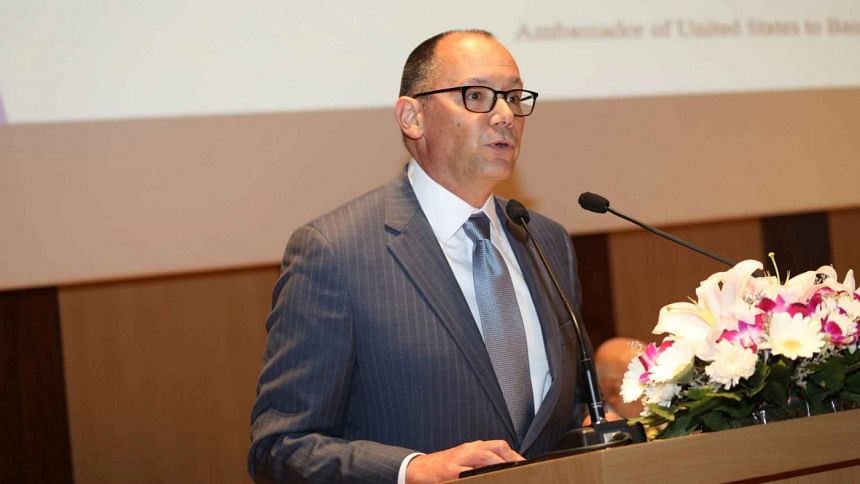
There was a time when the US government left no stone unturned to oust the government of President Nicolas Maduro in Venezuela. For years, a vicious propaganda was mounted against that government, sanctions were imposed, international financial links were cut, countries that would buy Venezuela's oil were reminded of consequences, and a campaign to isolate it was set afoot. Perhaps the most controversial and decisive move was the US', followed by others', recognition of an alternative government formed by a little-known opposition leader, Juan Guaido, as the legitimate government of Venezuela. In what amounts to an about-turn, the Associated Press reported on May 17, 2022 that the US would ease sanctions to revive links with Maduro government and allow Chevron to deal with the state-owned oil and gas company PDVSA—obviously, to tackle the energy crisis caused by the Ukraine war and the accompanying sanctions and embargo on Russian oil and gas.
It is not for us to comment on what policies the US government should pursue for its own interests. They are their own best judge and have the sovereign authority to do so. So why does it become such a big deal when we do the same?
The US Ambassador to Bangladesh, Peter Haas, speaking to the Diplomatic Correspondents Association, Bangladesh (DCAB) on Tuesday, said, "The United States has decided to put human rights, the issues of freedom of press at the centre of our foreign policy and we make no excuses about that." What he means is that the US will not accept any excuses on these counts. What about human rights and press freedom in Saudi Arabia, a long-time US ally, and Turkey, a Nato member?
Whenever, nationally or internationally, somebody roots for the free press, we journalists cheer. So the US support for free media here in Bangladesh is music to our ears. However, we cannot forget that presidential candidate Donald Trump, in an interview with Scott Pelley on 60 Minutes in 2015, commented, "Journalists are among the worst people I know." After assuming power, in a Tweet, he termed the news media "the enemy of the American people" (February 17, 2017). He thrashed every independent media in the country while in power and only eulogised Fox News, which, compared to all the serious and highly respected US media outlets, spews hatred, racism, divisiveness and misinformation. So, we think it is a fair question to ask: Would Ambassador Haas have said the same thing if he was representing Trump's administration and not President Biden's? Today, Trump's return in the next election is not ruled out. So, if it does happen—God forbid—then would the US follow the same policy on free press? Are we to believe that supporting free press in Bangladesh is the Biden administration's policy, and that it may change with the change of guards in the White House? Are we expected to tailor our internal policies to suit that of the US administration of the day?
Coming to free and fair elections, we definitely want it and are delighted to know that the US wants it, too. But how will the US judge how free and fair an election has been?
According to the US media, the majority of Republicans believe, even after nearly two years and numerous court pronouncements as to its authenticity, that the last election was stolen from them and that their candidate, Donald Trump, had actually won it. This is after a totally free and fair election was held in the US. So, suppose we hold a free and fair election, and the party that loses claims that the election was stolen from them. How will Ambassador Haas judge the outcome?
I have read very carefully Ambassador Haas' recent speeches delivered on March 31, April 24, May 10, 24 and 31, and found a lot to chew on and think about. What perhaps brings the US geostrategic thinking home to us is evidenced in his speech at an international conference titled "Moving Forward in the Indo-Pacific," held on March 31 at Independent University, Bangladesh (IUB). Ambassador Haas spelt out five key elements of the US' Indo-Pacific Strategy as "free and open, connected, prosperous, secure, and resilient." On the face of it, we have no problem with these key elements. It is in their elaboration where the real story lies. When the US ambassador says, "The people of the Indo-Pacific also want democracy and for their human rights to be respected," and when he further states, "We will bolster Indo-Pacific security… threats are evolving. Our security approach must evolve with them," which country he is talking about should not escape us. Howsoever worded, the elephant in the room is China, and we would be extremely naive not to understand it.
Ever since opening up with China in 1971, the US-China relationship developed to become a crucial aspect of global stability and significantly contributed to worldwide prosperity, with the highest number of humans freed from the shackles of poverty. Since China was following the market economy and allowed foreign investment, especially from the US, the latter may have thought that, over time, China would dilute its centralised economic structure and become more a part of the capitalist world. Seeing that it is not happening, and becoming fearful of China's economic prowess and strides in technology, AI, biotechnology, etc, the US has decided—publicly from the time of President Trump—to take China on fully and is now busy galvanising global and regional support behind it. South Asia, with the specific rivalry between India and China, provides the US a fertile ground to consolidate its anti-China approach, now galvanised into the fast lane with Russia's invasion of Ukraine.
It is this fast-moving and dangerously confrontational world that Bangladesh must navigate. Prime Minister Sheikh Hasina did a highly creditable job of taking our relationship with India to greater heights, and at the same time allowing Chinese investments in important sectors. This policy has benefited us enormously. India, in spite of its own issues, has not allowed the exogenous forces to determine its relations with China. Their bilateral trade grew a whopping 43.3 percent in 2021, reaching a total of USD 125.7 billion.
However we look at it, the Indo-Pacific Strategy of the US has profound implications for Asia, South Asia, and for us in Bangladesh. We welcome all possibilities of improving our relations with the US, and we are determined to explore every possibility to take our bilateral relations to greater heights. However, we should be very conscious of what it entails in terms of our relations with other countries in the region and beyond. As our prime minister said, "Asian countries have common development challenges and should face them collectively,"—and not divisively.
Mahfuz Anam is the editor and publisher of The Daily Star.

 For all latest news, follow The Daily Star's Google News channel.
For all latest news, follow The Daily Star's Google News channel. 

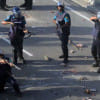
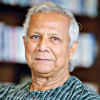
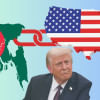
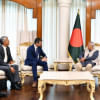



Comments